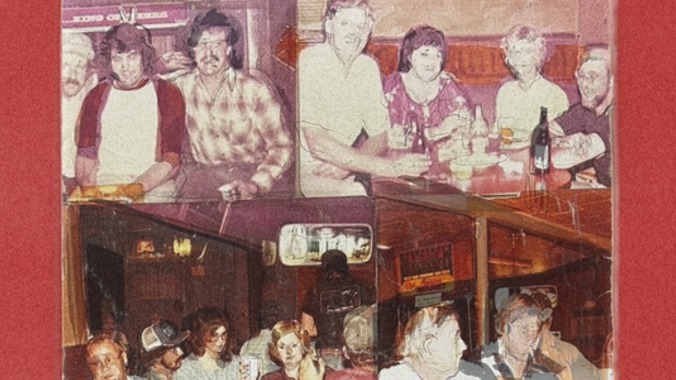Zach Bryan Limits Himself on the Too-Long, Self-Serious and Minimalist The Great American Bar Scene
The Oklahoma superstar boasts bravery through candid, authentic admissions, but his latest album takes few risks and often reverts to an amiable, continuous blur.
Music Reviews Zach Bryan
Much of Zach Bryan’s success seems to be a direct response to his peers in the mainstream. Country music’s return to the forefront of popular music in recent years has often felt more like a regression than a progression—the dominance of Morgan Wallen dispiritingly hollow and cynical, and his bloated LP One Thing at a Time having dominated the Billboard 200 for 70 weeks now. Even the omnipresence of Luke Combs’ tacky (but well-intentioned) cover of Tracy Chapman’s “Fast Car” felt like a backwards step for a genre that so often has many thoughtful, introspective songwriters waiting in the wings.
A bright spot then has been the rise of Zach Bryan, who was responsible for two of this decade’s strongest country hits: “I Remember Everything” with Kacey Musgraves and “Something in the Orange” (which has been certified 7x Platinum since its release in 2022). In a musical landscape oversaturated with bro-country, awkward country-trap fusions and soulless corporate takes on the genre, Bryan’s music arrived to us genuinely authentic and homespun, rather than surface-level songs marketed as something deeper.
The best songs on Bryan’s newest LP, The Great American Bar Scene, carry this spirit. “28” begins with a devastating admission (“Took 28 years of blood I was lost in / To feel loved on my own birthday”) that suggests an artist still working out his innermost concerns alone with his guitar while tuning out the world around him. This is seemingly confirmed by The Great American Bar Scene’s lack of anything resembling an obvious commercial hit—the LP’s default mode is slow, self-serious and minimalist.
Tuning out the wider world, as Bryan does here, has its perks—as evidenced on “28” and later on the breathtaking “Pink Skies.” But, it can also lead to an album that feels frustratingly insular. Much of The Great American Bar Scene feels like a retread of Bryan’s self-titled LP from last year—so much so that you wouldn’t be surprised if the Oklahoman hitmaker were to announce that these songs were all B-sides from the Zach Bryan sessions. His favorite topics to sing about remain the same: the disenfranchisement of small towns, the aimlessness of 21st Century youth and his own self-destructive tendencies. With only 10 months having passed since Zach Bryan, Bryan hasn’t yet found many new takes on these familiar themes. His lyrical tendency towards the descriptive doesn’t always serve him well, and his efforts to signal his ongoing authenticity (despite eye-watering success) can read as forced and/or overly simplistic (see: “That bullshit you see on the late-night TV is a long way from our beatin’ hearts” on “Like Ida”).
As Bryan’s prominence has skyrocketed, he’s steadily avoided wading into political territory—at a time where the public at-large has increasingly come to deem intervention in such matters as a moral obligation for those with outsized platforms. “The more a person includes politics into their life anywhere besides a ballot the more I figure they don’t have anything more interesting to do or say,” Bryan posted on X/Twitter last month. It’s hardly a surprising stance, given that taking any political stance would certainly alienate Bryan from a large portion of his audience, but it is also a stance that separates Bryan from so many of his genre’s most impactful predecessors—and his own songwriting heroes like Jason Isbell, Tyler Childers and Bruce Springsteen (the latter of whom features on the “I’m on Fire”-like “Sandpaper”). Here, his apoliticism can seem symptomatic of a wider disengagement with anything outside the autobiographical—which has a limiting impact on Bryan’s world-building capabilities (especially given the multiple nods he makes to Springsteen and the stark, non-apolitical Nebraska on the title track and “Oak Island”).
However, Bryan’s self-imposed limitations regarding what he will and won’t sing about would be less noteworthy if the minimalist soundscape of The Great American Bar Scene didn’t draw so much attention to lyricism. While the quiet solitude of the album works in places, like on the heart-wrenching tribute to a deceased friend, “The Way Back,” it can lead you to desperately wish for a melody to latch on to elsewhere. At over one hour in length, the music of Bar Scene often reverts to an amiable, continuous blur.
Still, when the music falters and a sense of over-familiarity kicks in, it’s impossible to deny the bravery of Bryan’s admissions and the power his words have at their most candid. The compelling “Purple Skies” offers a conversation with a deceased friend, filled with vignettes of now-painful memories like height markings on the wall. On the track, Bryan offers a series of simple but effective instructions for rebuilding after tragedy: “pack the car and dry your eyes…mop the floors, stand tall.” The best moments on The Great American Bar Scene—be them “Purple Skies,” “The Way Back” or “28”—concern the greatest depths of our shared human conditions. On “28,” Bryan alternates between stark admissions of being unloved and celebrations of being alive amidst the wreckage (“How lucky are we?… We’re home somehow”). The poet Mary Oliver once said that “it is a serious thing just to be alive on this fresh morning in this broken world.” In the country mainstream, there’s still no one who quite appreciates this like Bryan does.